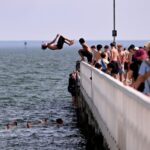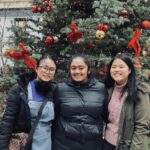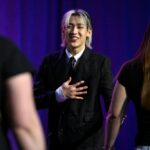
If you’re thinking of studying in Canada, the first images that often come to mind are the vast forests, maple syrup, hockey games, and the Niagara Falls. But along with the excitement comes a question many can’t help but ask: Can I handle the cold?
Here’s the twist — it’s not as daunting as it sounds, especially in Regina. Yes, winter could bring -30°C cold spells, but summer balances it out with +30°C warmth. And even on the chilliest winter days, the sky stays sunny, which not only makes a big difference in the winter but also reflects the people of the University of Regina’s Faculty of Kinesiology and Health Studies.
Right here, in this one-of-a-kind setting, you’ll find a place where academic excellence meets a community so welcoming, it might just feel like your second home.
The best base to shape the future of health, wellness, and community
The multi-faceted Faculty of Kinesiology and Health Studies offers undergraduate and graduate programmes in health, kinesiology, and sport and recreation studies. For over 50 years, it has been at the heart of southern Saskatchewan. From varsity and club sports to youth and adult programmes, the faculty touches lives at every stage. It also manages some of the best facilities on the U of R main campus, including the Fitness and Lifestyle Centre and multi-purpose activity and fitness spaces.
Yet, beyond the facilities and programmes, it’s the sense of community that makes the faculty truly special. It’s small enough for even graduate students to really get to know their classmates, professors, and staff and the larger community.

The U of R works with the Equity, Diversity and Inclusion (EDI) Office to make sure the campus is a safe, inclusive, and welcoming place for all. Source: University of Regina
Hands-on, minds-on
The faculty provides seemingly countless opportunities for graduate students to get involved. Amir Yahya Rajaei, for example, is working on a research project for faculty member Dr. Patrick Neary.
What he values most is the freedom to choose his projects and courses, a flexibility he didn’t have back in France. “You do a little bit of your thesis every day, whether it’s data collection, data analysis, writing, or reading papers,” he says.
But his days rarely stop there. Rajaei often finds himself helping in his supervisor’s (Dr. Cameron Mang) lab or assisting others. He’s taken on teaching assistant jobs as well. “As a grad student, you’ve already passed those courses, so you know what undergrads need to succeed,” he says. “It’s nice to be able to guide them with tips and suggestions to help them do better.”
Similarly, Elise Melanson, an MSc student about to begin her PhD at the U of R, has found teaching to be one of the most rewarding parts of her journey. “In KIN101 : Writing and Discourse for Academia, I like showing how fun academic writing is to younger students,” she says.
With KIN170: Lifestyle, Health, and Wellness, she enjoys challenging their assumptions about health. “A lot of them come in with a very medical-model mindset, thinking every patient will be the ‘perfect’ patient. I show them how every patient comes with a different set of social circumstances and their ability to do their treatment and things of that nature.”
While teaching is a great way to connect with undergrads, it’s a chance for graduate students to grow too. It builds communication and organisation skills, content mastery, and even classroom management experience.
For PhD student Flavia Rusterholz, it’s exactly why she jumped at every chance to teach. “Teaching really exposes me to public speaking, management skills, and just standing in front of so many people,” she says. “This is definitely some real good exposure that I’m getting here, and that is a huge positive to me.”

The U of R sits in one of North America’s largest urban parks, with a welcoming environment for learning, research, and collaboration. Source: University of Regina
More than a place to study
There’s so much to do here, all within a welcoming city. The U of R is in Wascana Park, a beautiful urban park that gives the campus a calm, natural vibe. Aside from great weather, Regina is a walkable city, with plenty of housing options and a low cost of living. “The community around the university and the city is really beautiful,” says Melanson. “Wascana is right down the road. I walk to school every day, and I really enjoy the feeling of the campus.”
You will learn about the land’s history and the people who shaped it too. The university is committed to acknowledging Indigenous contributions and working toward reconciliation. For many, this is an eye-opening experience.
“Before I came here, my perspective on life was really narrow,” Rajaei admits. “I’ve previously lived in Vancouver for two months for an internship, but that doesn’t compare to actually living here.”
Now, he’s met Indigenous people, listened to their stories, and learned about their culture firsthand. “It was a nice experience, truly one of my standout moments at the U of R,” Rajaei says.
Follow the University of Regina on TikTok, Instagram, Facebook, X, YouTube, and LinkedIn.







